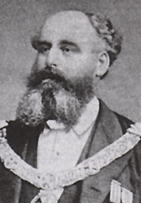William Robert Woodman
William Robert Woodman (* 1828 in Jeevo , England ; † December 20, 1891 in London ) was an English doctor , Freemason , Rosicrucian and one of the founders of the Hermetic Order of the Golden Dawn .
Live and act
William Robert Woodmann studied medicine in London and received his doctorate in 1851. Woodman then went on to be a practicing doctor at Victoria Villas, Stoke Newington. He became secretary of the Societas Rosicruciana in Anglia (Rosicrucian Society) founded in 1868 . This society was a scholarly and ceremonial association open only to masters of Freemasonry.
When Robert Wentworth Little died in 1878, Woodman was his successor as the company's "Supreme Magus". As a student of Kabbalah , Egyptology and familiar with the works of the Gnostics , Platonists , Neoplatonists and medieval sciences such as astrology , alchemy and tarot , he gave society a touch of spiritualism , although it was not actually intended as a school for Kabbalistic and occult teachings. William Wynn Westcott and Samuel Liddell MacGregor Mathers , the two subsequent founders of the Esoteric Order of the Golden Dawn, were also members of the Rosicrucian Society.
They were very interested in ritual magic , alchemy and Kabbalah. This deepened her friendship with Woodman and led to a growth in society. For many years, Woodman was a kind of mentor for Westcott, who had met him shortly after he had settled in London.
At the time the Esoteric Order of the Golden Dawn was in its infancy, many people were dissatisfied with the esoteric study opportunities available to them. For example, Helena Petrovna Blavatsky had founded a group called the Theosophical Society . This attracted many people with its spiritual and intellectual content, although many felt repulsed because of its oriental influence. Mathers, Westcott and Woodman believed that they could offer something better and different to those discontented, who sought hidden knowledge.
It was Westcott, after all, who won Woodman over to help found the Golden Dawn . Woodman was much older than Westcott and Mathers. His role in the creation of the order gave it a touch of devotion and honor. He retired from medicine at this point and his dignified, Victorian demeanor makes him a perfect leader for the Order. Its age led many people to believe that the Order was an old man's club. However, this was rarely the case, as the members had an average age between 20 and 30 four years after the foundation.
Woodman stayed away from the limelight. While he may have been the leading spirit of the Order , his participation was limited. His advanced age, poor health, and the fact that he lived in a rather distant suburb held him back to some extent.
There are relatively few publications by Woodman. This is all the more astonishing since he wrote many writings and was among other things co-editor of the Rosicrucian , a journal of the Rosicrucian Society.
Woodman died on December 20, 1891 after a brief illness. He left a letter to Westcott in which he designated him as his successor at the Societas Rosicruciana in Anglia .
Web links
- Biography and Images (English)
- Biography and picture (English)
- Biography with Westcott (English)
| personal data | |
|---|---|
| SURNAME | Woodman, William Robert |
| BRIEF DESCRIPTION | English physician, Freemason, Rosicrucian, and one of the founders of the Golden Dawn |
| DATE OF BIRTH | 1828 |
| PLACE OF BIRTH | Jeevo , England |
| DATE OF DEATH | December 20, 1891 |
| Place of death | London |
